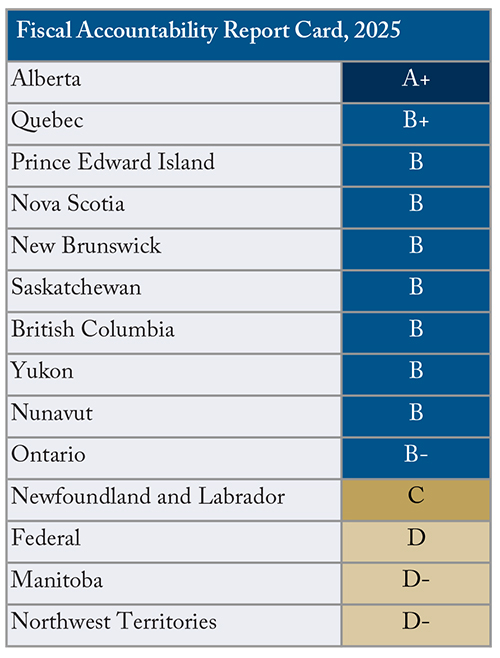Home / Publications / Media Releases / Can Taxpayers Follow the Money? Fiscal Accountability Report Card on Canada’s Senior Governments is Out
- Media Releases
- |
Can Taxpayers Follow the Money? Fiscal Accountability Report Card on Canada’s Senior Governments is Out
Summary:
| Citation | . 2025. "Can Taxpayers Follow the Money? Fiscal Accountability Report Card on Canada’s Senior Governments is Out." Media Releases. Toronto: C.D. Howe Institute. |
| Page Title: | Can Taxpayers Follow the Money? Fiscal Accountability Report Card on Canada’s Senior Governments is Out – C.D. Howe Institute |
| Article Title: | Can Taxpayers Follow the Money? Fiscal Accountability Report Card on Canada’s Senior Governments is Out |
| URL: | https://cdhowe.org/publication/can-taxpayers-follow-the-money-fiscal-accountability-report-card-on-canadas-senior-governments-is-out/ |
| Published Date: | October 23, 2025 |
| Accessed Date: | October 23, 2025 |
Outline
Outline
Related Topics
October 23, 2025 – Canada’s federal, provincial and territorial governments should be more transparent about how they tax and spend, says a new report card from the C.D. Howe Institute. The report reveals big contrasts across the country. Alberta topped the class with an A+ for budgets, estimates and public accounts that were timely, accessible and reliable. The federal government earned a D for lateness and obscure presentations in its budget and estimates.
In “Making the Grade: The Fiscal Accountability Report Card for Canada’s Senior Governments, 2025,” William B.P. Robson and Nicholas Dahir assess how clearly each senior government reports on its public finances – grading the accessibility, reliability and timeliness of their budgets, estimates and year-end financial statements.
Quebec followed Alberta with a B+. Prince Edward Island, Nova Scotia, New Brunswick, Saskatchewan, British Columbia, Yukon and Nunavut earned Bs. Ontario received a B-. Newfoundland and Labrador earned a C. Trailing the federal government were Manitoba and the Northwest Territories, with grades of D-.
“Looking back, we’ve seen progress – more governments are using consistent accounting,” said Robson, the Institute’s President and CEO. “But timeliness is an ongoing challenge. Too many budgets are late, and most governments take far too long to produce their financial statements. We also highlight concerning instances of gaps between what budgets promise and what the public accounts later show.”
The federal government’s grade slipped this year, with key numbers buried hundreds of pages deep in its budget, inconsistent accounting and delayed financial statements. British Columbia, once an A-level performer, has dropped lately, with discrepancies flagged by its auditor general.
By contrast, Alberta stood out for presenting numbers consistent with Public Sector Accounting Standards in all its documents, releasing its public accounts within 90 days of fiscal year-end, and providing regular in-year updates.
“People shouldn’t need to be accountants to understand a government’s budget and financial statements,” said Dahir. “A motivated voter, legislator or reporter should be able to find the key numbers easily – to see what the government planned to spend and collect at the start of the year, and to compare those plans with the actual revenues, expenses and surplus or deficit reported after year-end.”
Looking ahead, the Institute’s preview of 2026 grades shows Alberta on track to retain its top position, while the federal government – which has not yet produced a budget for the 2025/26 fiscal year – is on track to receive an F.
“The top performers show it can be done, and others should follow their lead,” Robson added. “If Canadians demand better financial reporting, and legislators take their responsibility to steward public funds seriously, governments will have no excuse for falling short.”
For more information, contact: William B.P. Robson, President and CEO, C.D. Howe Institute; Nicholas Dahir, Research Officer, C.D. Howe Institute; Percy Sherwood, Associate Editor and Communications Officer, C.D. Howe Institute, 416-407-4798, psherwood@cdhowe.org.
The C.D. Howe Institute is an independent not-for-profit research institute whose mission is to raise living standards by fostering economically sound public policies. Widely considered to be Canada’s most influential think tank, the Institute is a trusted source of essential policy intelligence, distinguished by research that is nonpartisan, evidence-based and subject to definitive expert review.
Want more insights like this? Subscribe to our newsletter for the latest research and expert commentary.

Related Publications
- Research
- Intelligence Memos
- Intelligence Memos
- Intelligence Memos